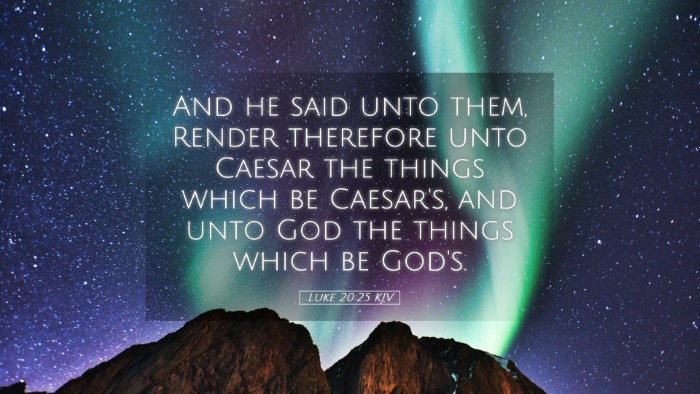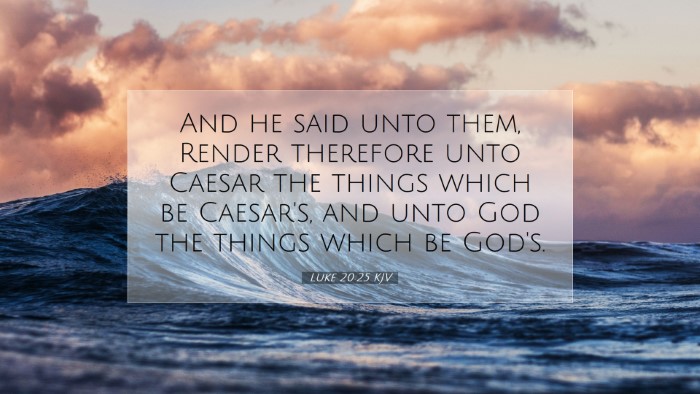Commentary on Luke 20:25
Bible Verse: "And he said unto them, Render therefore unto Caesar the things which be Caesar's, and unto God the things which be God's." (Luke 20:25, KJV)
Introduction
This verse is situated within a critical narrative in the Gospel of Luke where Jesus faces challenges from the religious authorities. It encapsulates profound teaching on the relationship between the state and God, and invites all believers to reflect on their obligations in both realms. The insights from esteemed commentators shed light on its theological and practical implications.
Contextual Analysis
Before diving deep into the specifics of Luke 20:25, it is essential to explore the context surrounding this verse. The Pharisees and Herodians sought to trap Jesus with a question about paying taxes to Rome. Their intention was to place Jesus in a position where either answer he provided would lead to condemnation. However, Jesus provides a response that not only avoids their trap but also articulates a principle that resonates through both time and eternity.
Insights from Key Commentators
Matthew Henry's Commentary
Understanding the Response: Matthew Henry emphasizes that Jesus' reply highlights the distinction between civil and divine authority. By instructing the people to "render unto Caesar," Jesus acknowledges the legitimacy of governmental authority. Henry remarks on the importance of fulfilling civic duties while maintaining a clear devotion to God.
- Dual Responsibilities: Henry elaborates on the dual duties of citizens. Christians are to obey the government insofar as it does not contradict God’s laws.
- The Nature of God's Claim: He also discusses the deeper implications of "rendering unto God." God's claim is upon the entire being of the believer—heart, soul, and strength.
Albert Barnes' Notes on the Bible
Theological Implications: Albert Barnes provides a rich theological perspective on this passage. He elucidates the phrase "Render therefore unto Caesar the things which be Caesar's," explaining that it affirms the obligation of a disciple to acknowledge and accept civil magistracy as ordained by God.
- Civic Obligations: Barnes stresses that paying taxes is a part of rendering unto Caesar. He urges believers to be conscientious in fulfilling civil duties as members of a society.
- Divine Authority: The second part of the verse reinforces the notion that supreme allegiance is due solely to God. Barnes notes that this call to God represents a higher moral standard.
Adam Clarke's Commentary
Practical Application: Adam Clarke emphasizes the practical application of Jesus' directive. He indicates that the term "render" implies more than a mere financial transaction; it denotes an attitude of responsibility and respect towards authority.
- Separation of Realms: Clarke notes the wisdom in the separation of church and state inherent in this statement and the importance of not allowing one to unduly influence the other.
- God's Sovereignty: He further highlights that while believers are to obey civil law, they should also remember that their ultimate allegiance belongs to God. This balance is crucial for maintaining spiritual integrity.
The Nature of Rendering
To “render” is to give what is due. It encompasses the idea of fulfilling one's obligations willingly and faithfully. This notion is pivotal for understanding how Christians navigate their lives in secular contexts. The phrase raises vital questions:
- What does it mean to fulfill our obligations to the state?
- How do we prioritize our loyalty to God above all earthly authorities?
Implications for Modern Christians
The teachings extracted from this verse resonate deeply in the contemporary church. Pastors, theologians, and scholars can extract several applications:
- Participation in Society: Christians are encouraged to engage in their communities, participate in governance, and contribute positively to societal welfare.
- Political Engagement: The verse prompts a consideration of how Christians partake in political processes while maintaining fidelity to Christ’s teachings.
- Spiritual Integrity: It calls for a careful examination of how believers can express their faith without compromising their witness in the world.
Conclusion
Luke 20:25 serves as a profound reminder of the dual obligations imposed on Christians—being responsible citizens while remaining devoted to God. As analyzed through the lenses of prominent commentators, the implications of this verse are both broad and deeply personal. It encourages self-reflection and offers guidance on how to balance our earthly responsibilities with our heavenly calling. For pastors, students, theologians, and scholars, this passage continues to offer rich ground for discussion, teaching, and application.


